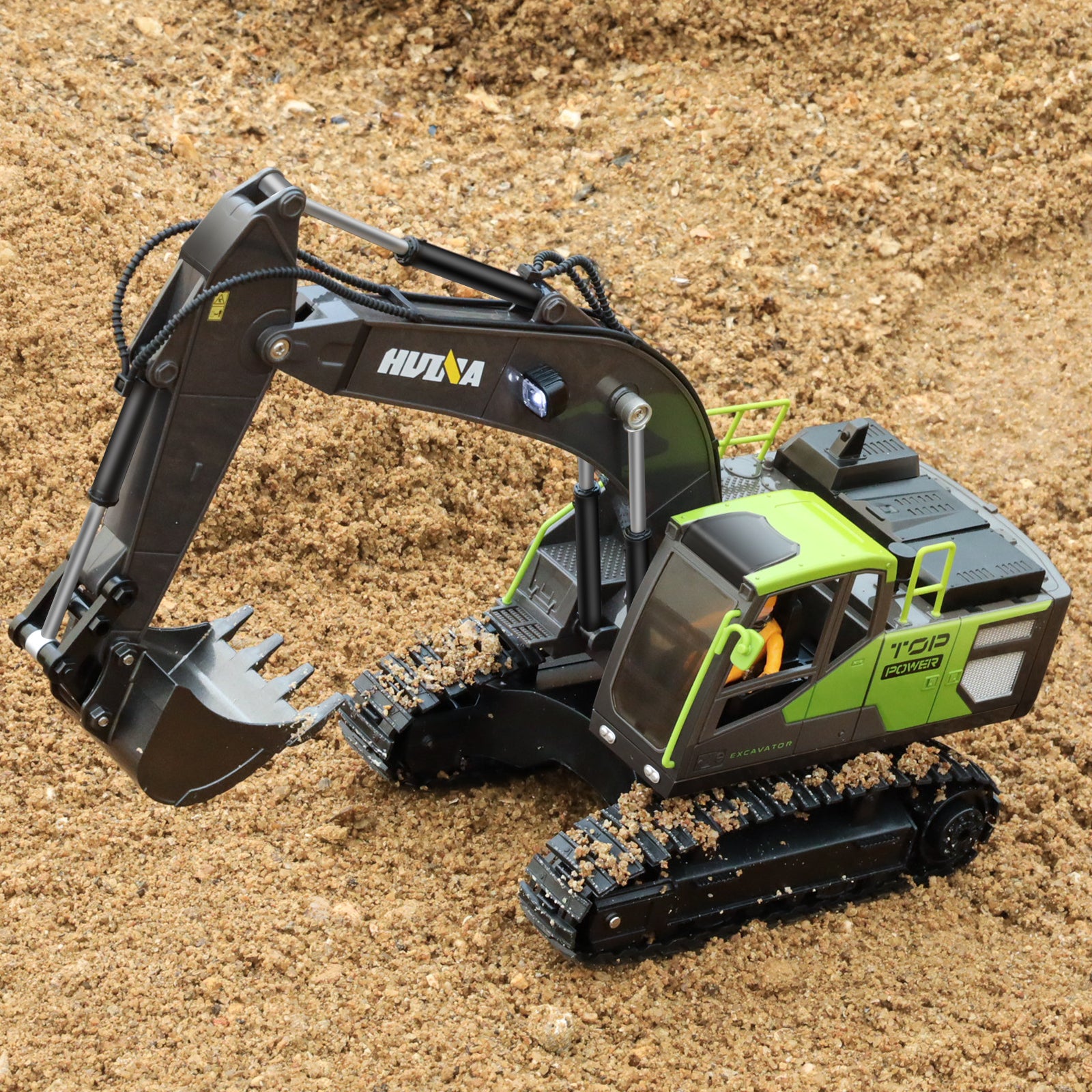Comprehending How Excavator Functions and Its Influence On Effectiveness
Excavators play a crucial function in building and construction and mining operations, relying upon an intricate interplay of mechanical and hydraulic systems. Their capacity to execute a selection of jobs hinges on both their style and the innovation integrated within. Comprehending these components can significantly influence functional performance and performance. As advancements proceed to improve the sector, one need to think about just how these changes will influence future methods and performance.
The Fundamentals of Excavator Mechanics

The Role of Hydraulic Systems in Excavators
At the heart of excavator operation exists the hydraulic system, which plays a crucial role in powering the equipment's functions and motions. This system utilizes pressurized hydraulic fluid to transfer power, allowing various activities such as training, excavating, and moving. By utilizing the principles of hydraulics, excavators can execute jobs with amazing precision and pressure, improving overall operational efficiency.The hydraulic system includes crucial elements, consisting of cyndrical tubes, pumps, and shutoffs, which collaborate to manage the circulation and instructions of the liquid. When the driver involves the controls, the hydraulic liquid is directed to particular cylinders, equating the driver's commands into physical activity. This system enables for smooth and receptive actions, which are vital in construction and excavation settings. double e volvo rc excavator. The performance of the hydraulic system straight impacts the productivity and adaptability of the excavator, making it a vital component in modern excavation processes
Trick Components of an Excavator
Recognizing the vital elements of an excavator is essential for grasping just how this powerful machine operates. An excavator contains numerous significant components, including the undercarriage, home, bucket, arm, and boom. The undercarriage offers security and mobility, usually featuring wheels or tracks to browse various surfaces. Your home has the engine and hydraulic systems, enabling the driver to manage activity and power the machine. The boom extends from your home, allowing upright reach, while the arm connects to the container, helping with digging and training operations.Additionally, the cab houses the driver, furnished with controls for exact handling. Each of these components plays a vital duty in the excavator's total performance, adding to its performance and effectiveness on building websites. Recognizing these parts helps in maintaining and maximizing excavator efficiency, guaranteeing tasks are completed safely and successfully.
Add-on Versatility and Its Advantages
Attachment flexibility is a vital element of excavators, enabling drivers to change between different devices customized for certain jobs. This versatility not just enhances job performance however also adds to cost-effectiveness by minimizing the requirement for several devices. Understanding the various types of attachments readily available can considerably impact the overall efficiency and capability of an excavator on work websites.
Sorts of Attachments
While excavators are mostly recognized for their digging capabilities, their true flexibility depends on the broad range of attachments readily available. These attachments boost the excavator's capability, allowing it to execute various jobs past excavation. Usual add-ons include pails (for digging and scooping), hydraulic thumbs (for comprehending materials), and augers (for piercing openings) Grapples are made use of for handling and relocating debris, while rippers can separate hard surfaces. Other specialized attachments, such as trenchers and rakes, make it possible for excavators to adapt to details work needs. This variety not just enhances the equipment's energy across different markets, consisting of building, landscape design, and demolition, but also permits drivers to customize their equipment to satisfy specific project needs effectively.
Boosted Task Performance
Making best use of task efficiency is a key advantage of utilizing numerous excavator accessories. Different attachments enable an excavator to carry out numerous tasks without needing to switch tools, saving useful time and labor. For example, utilizing a hydraulic hammer can break concrete while a container attachment can excavate dirt, allowing a seamless operations. This flexibility reduces downtime connected with tools changes and improves productivity on-site. Furthermore, specialized add-ons enhance precision in tasks such as grading or landscape design, causing higher high quality results. The capability to adapt to various task requirements not only enhances procedures yet also minimizes the need for added equipment, making certain that tasks are completed promptly and properly. Overall, attachment versatility substantially contributes to enhanced job effectiveness in excavation work.
Cost-Effectiveness and Flexibility
Cost-effectiveness is a significant advantage of making use of flexible excavator attachments. These attachments allow a single excavator to do multiple tasks, minimizing the need for added equipment and labor - double e volvo rc excavator. By switching over between buckets, hammers, and grapples, operators can deal with various projects, from digging to demolition, thereby making the most of tools use. This adaptability not just lowers functional expenses but additionally lessens downtime connected with changing equipment. In addition, the capacity to customize excavators with specialized add-ons boosts efficiency, as they can successfully manage diverse tasks according to job demands. To wrap up, the combination of cost-effectiveness and versatility in excavator attachments adds to boosted functional effectiveness and source allocation in building and excavation jobs

Advanced Technology in Modern Excavators
Modern excavators are significantly equipped with innovative modern technology that changes excavation procedures. Automation streamlines operations, while improved fuel performance reduces functional prices. In addition, smart control systems enhance accuracy and safety and security, marking a considerable development in excavation devices.
Automation in Excavation Processes
As excavation innovation evolves, automation has actually become a crucial part in enhancing efficiency and precision on task sites. Modern excavators are geared up with innovative automated systems that promote jobs such as grading, excavating, and trenching with minimal operator treatment. These systems make use of sensors, GPS, and machine discovering formulas to ensure precise positioning and depth control, substantially minimizing the margin for error. Additionally, automation allows operators to concentrate on tactical decision-making rather than hand-operated controls, bring about boosted performance in general. Such developments not only streamline process yet additionally enhance security by lessening human error in intricate operations. The combination of automation in excavation procedures represents a significant improvement in construction modern technology, driving the market in the direction of greater efficiency and effectiveness.
Improved Fuel Performance
Developments in innovation have actually likewise led to considerable enhancements in gas performance for modern excavators. Modern equipments are geared up with advanced engines that maximize power outcome while minimizing gas intake. These engines use ingenious burning modern technologies, such as turbocharging and direct fuel shot, to enhance performance and effectiveness. Furthermore, lightweight materials in building and construction lower total weight, enabling less energy expense throughout procedure. The intro of variable speed controls allows drivers to adjust engine efficiency according to specific tasks, better browse around here minimizing fuel use. Because of this, these improvements not just reduced functional costs however additionally add to ecological sustainability by minimizing exhausts. Overall, boosted fuel efficiency in excavators is a vital advancement that reinforces performance and economic viability in the building industry.
Smart Control Systems
While drivers navigate progressively complicated job websites, clever control systems in excavators have emerged as essential tools for enhancing efficiency and precision. These sophisticated technologies utilize formulas and sensing units to monitor different specifications such as lots weight, surface conditions, and functional efficiency. By immediately changing hydraulic functions, wise systems enhance equipment efficiency, bring about boosted efficiency and minimized endure elements. In addition, operators profit from instinctive user interfaces that offer real-time feedback and diagnostics, allowing for educated decision-making. This integration of innovation not just simplifies operations however likewise decreases human mistake, contributing to safer job environments. As the construction sector continues to progress, clever control systems will play an important function fit the future of excavator efficiency and efficiency.
Enhancing Functional Effectiveness With Excavators
Excavators play a necessary role in improving operational effectiveness throughout various building and excavation tasks. Their versatility enables numerous tasks, including excavating, product, and training handling, which enhances process and reduces the need for additional equipment. With effective hydraulic systems, excavators can perform sturdy tasks with precision, substantially lowering the time called for to full tasks. The combination of sophisticated innovation, such as general practitioner and automated controls, better maximizes their procedure, making it possible for drivers to attain better precision and lower product waste. In addition, modern excavators are designed to eat less fuel and minimize emissions, adding to both expense financial savings and environmental sustainability. By using excavators properly, construction groups can improve efficiency, fulfill task due dates, and boost overall website management. This multifunctionality and performance make excavators crucial devices in the contemporary building and construction landscape.
The Future of Excavators in Building and Mining Industries
As the building and construction and mining markets develop, the future of excavators is poised for substantial improvement driven by technological innovation and transforming operational needs. Advancements in automation and artificial knowledge are reshaping excavator capacities, enabling improved accuracy and effectiveness in operations. Self-governing excavators are emerging, lowering the need for human intervention and minimizing the danger of accidents.Moreover, the combination of telematics and IoT innovation allows real-time monitoring of device performance and anticipating maintenance, optimizing uptime. Eco-friendly styles, including electrical and hybrid models, are obtaining traction, straightening with sustainability objectives within the industry.Additionally, using advanced materials and lighter layouts enhances fuel performance while preserving efficiency criteria. As these trends progression, excavators will play an essential duty in meeting the raising demands for efficiency and safety in building click site and construction and mining, inevitably changing functional landscapes.
Frequently Asked Concerns
Exactly How Do Weather Condition Problems Affect Excavator Efficiency?

Weather greatly affect excavator efficiency, as rainfall and mud can hinder traction and stability, while extreme temperature levels might influence hydraulic systems. Operators needs to adjust to these variables to guarantee optimal functionality and safety and security during procedures.
What Security Actions Should Operators Adhere To While Utilizing Excavators?
Precaution for excavator drivers consist of wearing appropriate personal protective tools, performing pre-operation examinations, ensuring correct communication with ground personnel, maintaining a secure range from overhead threats, and adhering to well established functional procedures to avoid mishaps.
Exactly How Often Should Excavators Be Preserved for Optimum Performance?
Excavators should be kept on a regular basis to guarantee peak efficiency, generally every 250 operating hours or as defined by the manufacturer. Regular checks enhance dependability, avoid unforeseen failures, and expand the lifespan of the tools.
What Is the Ordinary Lifespan of an Excavator?
The average life expectancy of an excavator generally varies from 10,000 to 15,000 hours of operation. Aspects influencing longevity include maintenance methods, running problems, and the quality of the equipment itself, impacting general efficiency and effectiveness.

Can Excavators Operate on Unequal Terrain Efficiently?
Excavators can run properly on irregular terrain due to their verbalized layouts and flexible tracks. These attributes enable them to preserve stability and traction, enabling effective operation in challenging environments commonly encountered in building and landscaping tasks. Each of these elements plays a crucial duty in the excavator's overall capability, contributing to its effectiveness and performance on construction websites. Making best use of work performance is a primary benefit of utilizing different excavator add-ons. While drivers browse increasingly intricate job websites, clever control systems in excavators have actually arised as crucial devices for improving effectiveness and precision. Excavators play a vital role in boosting functional home efficiency throughout different building and excavation jobs. Developments in automation and synthetic intelligence are reshaping excavator capacities, allowing for boosted accuracy and effectiveness in operations.